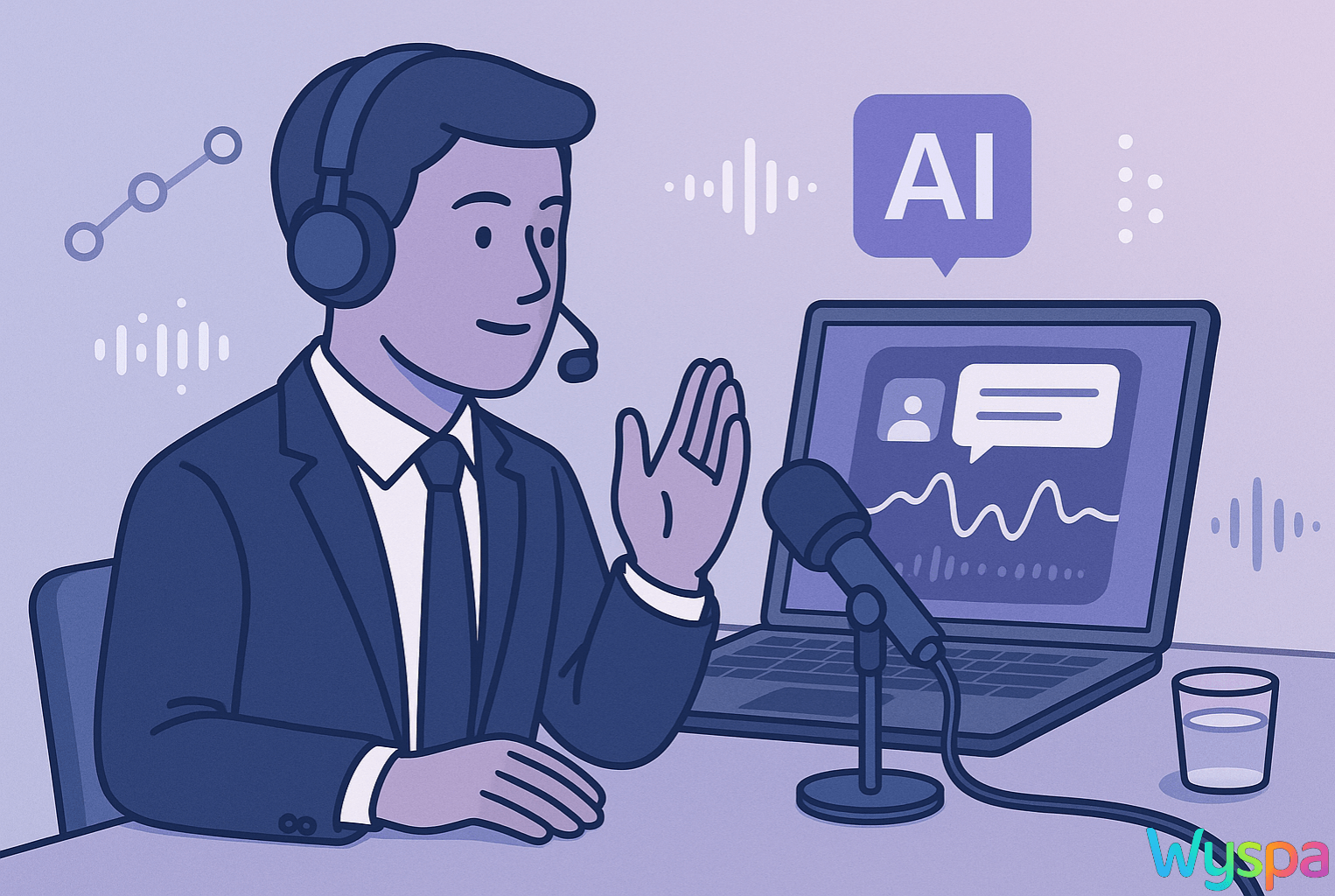Mastering Behavioral Interviews: Practice Questions and AI Analysis

TLDR: How to Ace Your Next Behavioral Interview
- Use the STAR method (Situation, Task, Action, Result) to structure your answers
- Practice with real questions from your industry
- Record yourself to review your performance
- Get feedback on your answers, tone, and pacing
- Learn from mistakes by understanding where you can improve
- Try AI-powered interview prep with Wyspa for personalized practice
- Focus on familiar themes: leadership, teamwork, conflict resolution
- Be authentic in your responses while highlighting your strengths
What Are Behavioral Interviews?
Behavioral interviews are a typical job interview where employers ask questions about your past experiences and behaviors to predict how you might perform. These questions typically start with phrases like "Tell me about a time when..." or "Give me an example of..."
Instead of asking hypothetical questions, interviewers want to hear specific stories from your work history demonstrating the key skills and qualities they seek.
Why Traditional Interview Prep Falls Short
Most people prepare for interviews by:
- Memorizing generic answers
- Reading sample questions online
- Practicing in front of a mirror
- Asking friends for mock interviews
While these methods are better than nothing, they have some big problems:
- Limited feedback: Friends might be too lovely to give honest criticism
- Generic practice: Sample questions may not match your specific industry
- No structure: Without proper guidance, your answers might ramble
- No measurement: It's hard to know if you're actually improving
The STAR Method: Your Secret Weapon
The most effective way to answer behavioral questions is with the STAR method. This technique helps you structure your response in a clear, concise way that interviewers love.
STAR stands for:
- Situation: Briefly describe the context or challenge you faced
- Task: Explain what your responsibility was in that situation
- Action: Detail the specific steps you took to address the task
- Result: Share the outcomes of your actions (use numbers when possible!)
For example, if asked, "Tell me about a time you resolved a conflict at work," a STAR response might look like:
Situation: "In my previous role, two team members had different visions for an important client project, causing tension and delays."
Task: "As the project lead, I needed to resolve this conflict quickly to meet our deadline while ensuring both perspectives were considered."
Action: "I organized a dedicated meeting where everyone could share their ideas without interruption. Then I facilitated a discussion to identify the strengths in each approach and helped the team create a combined solution that incorporated the best elements from both."
Result: "We met our deadline and delivered a solution that the client praised for its creativity. The team members also developed a better working relationship afterward, and we used this collaborative approach on future projects."
Common Behavioral Interview Questions
Here are some frequently asked behavioral questions you should prepare for:
Leadership
- Tell me about a time you led a team through a complex project.
- Describe a situation where you had to motivate others.
- Give an example of how you've influenced people without formal authority.
Problem-Solving
- Tell me about a complex problem you solved at work.
- Describe a time when you had to decide with limited information.
- Share an example of when you had to think outside the box.
Teamwork
- Give an example of when you worked effectively in a team.
- Tell me about a time you had to collaborate with someone difficult.
- Describe a situation where you had to build consensus among team members.
Adaptability
- Tell me about a time you had to quickly adjust to a significant change.
- Describe how you've handled an unexpected obstacle.
- Share an example of when you had to learn something new quickly.
Conflict Resolution
- Describe a time when you had to resolve a conflict at work.
- Tell me about a disagreement you had with a supervisor or coworker.
- Share an example of how you've handled criticism.
How AI is Revolutionizing Interview Preparation
Traditional interview preparation has limitations, so AI-powered tools are becoming increasingly popular. These tools offer several advantages:
- Personalized feedback: Get an objective analysis of your responses
- Industry-specific questions: Practice with questions tailored to your field
- Convenient practice: Train anytime, anywhere without scheduling with others
- Measurable improvement: Track your progress over time
Introducing Wyspa: Your AI Interview Coach
Wyspa is an AI-powered web app explicitly designed to help you ace your behavioral interviews. It creates custom mock interviews based on your job domain and gives you detailed feedback on your performance.
How Wyspa Works
- Select your job domain: Choose from various industries to get relevant questions
- Optional focus area: Narrow down to specific skills you want to practice
- Answer questions: Respond via audio recording, just like in a real interview
- Get instant feedback: Receive detailed analysis on your content, pacing, and word choice
- Improve your answers: Use AI assistance to refine your responses
- Build confidence: Practice repeatedly until you feel ready
Key Features of Wyspa
- Customized questions: Questions tailored to your specific job domain
- Comprehensive scoring: Get rated on a scale of 1-5 for different aspects of your answer
- "Teach Me" feature: Get educational support if you're stuck on a question
- Real Interview mode: Experience a full simulated interview with immediate feedback
Tips for Using AI to Prepare for Behavioral Interviews
To get the most out of AI-powered interview preparation tools like Wyspa, follow these tips:
- Be consistent: Practice regularly, not just the night before your interview
- Use a quiet space: Ensure your recordings are clear and free from background noise
- Treat it like a real interview: Dress professionally and maintain good posture
- Review your feedback: Don't just move on—learn from each practice session
- Vary your questions: Don't practice the same questions repeatedly
- Use the STAR method: Structure your responses clearly, even during practice
- Be authentic: While preparing, focus on telling your genuine stories effectively
Making the Most of AI Feedback
When you receive feedback from an AI tool like Wyspa, pay attention to:
- Content relevance: Are you actually answering the question asked?
- Structure: Does your answer follow a logical flow (like STAR)?
- Pacing: Are you speaking too quickly or too slowly?
- Word choice: Are you using powerful, positive language?
- Length: Are your answers concise, or do you ramble?
Common Mistakes to Avoid in Behavioral Interviews
Even with excellent preparation, it's easy to fall into these common traps:
- Being too vague: Not providing specific examples
- Focusing on the negative: Complaining about past experiences
- Not taking responsibility: Blaming others for failures
- Memorizing scripts: Sounding rehearsed rather than authentic
- Rambling: Talking too much without a clear point
- Using the same example: Repeating the same story for different questions
- Not highlighting your role: Failing to emphasize your personal contribution
Final Thoughts
Mastering behavioral interviews takes practice, but you can significantly improve your performance with the right approach and tools like Wyspa. By combining the structured STAR method with personalized AI feedback, you'll be able to compellingly showcase your skills and experiences.
Remember that a behavioral interview aims to tell your professional story effectively. The interviewer wants to understand how you've handled situations in the past to gauge how you'll perform in their organization.
Ready to take your interview skills to the next level? Practice with Wyspa today and transform your interview performance with AI-powered feedback and coaching. All it takes is signing in and creating an account, and you can start practicing in less than a minute.
